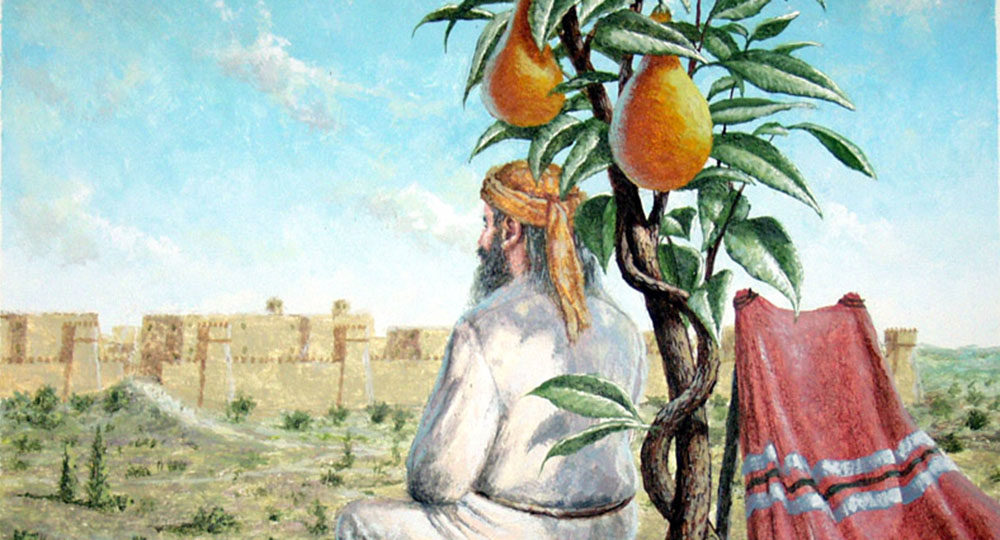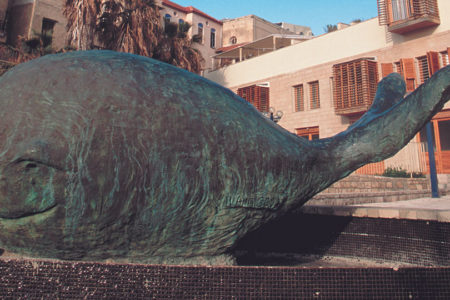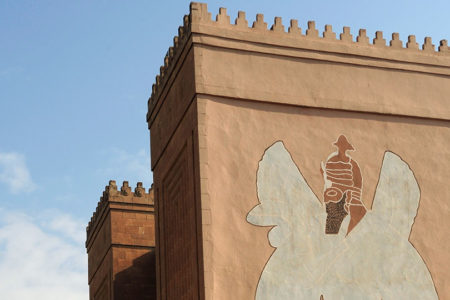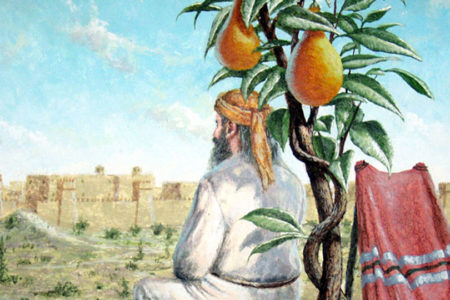The Angry Prophet Jonah 4
If we were writing the book of Jonah, how would we end the story? We’d probably have Jonah rejoicing over being restored from disobedience, rescued from the great fish, recommissioned in the Lord’s service, and returned to Nineveh to preach a great revival there. However, God’s ways are not our ways. In chapter 4, God unveils Jonah’s attitude toward the redemption of a hated people while contrasting His deep love for and grace toward all peoples. Keep in mind, Nineveh was located in the country we know today as Iraq.
Jonah’s Anger
Jonah was an unhappy prophet. God had done exactly what Jonah expected He would do: He spared Nineveh from judgment when the city repented (3:10). The decision “displeased Jonah exceedingly [Jonah thought it a great evil], and he was very angry” (v. 1). Note the interesting comparison. Like Nineveh, Jonah had been the object of God’s extreme displeasure and divine anger; but the prophet was shown mercy. Jonah had been saved from a storm (1:4–5), drowning (1:15), and death in the fish’s belly (1:17). But prejudice blinded Jonah to the mercy God had bestowed on both him and Nineveh.
Jonah prayed to God in anger and had the audacity to rebuke the Lord for His forgiveness to Nineveh:
I pray thee, O LORD, was not this my saying, when I was yet in my country? Therefore, I fled before unto Tarshish; for I knew that thou art a gracious God, and merciful, slow to anger, and of great kindness, and repentest thee of the evil (v. 2).
He quoted Joel 2:13 almost word-for-word, proving that he knew God’s nature was one of grace and compassion. Knowing the Lord’s mercy, he fled to Tarshish because he did not want to preach to Nineveh and see God save the nation. He knew the Lord would bestow mercy on Nineveh if it manifested any sign of repentance (cf. Ex. 34:6–7). Without shame, the prophet laid bare the motivating impulse of his heart—an unbelievable loathing for Nineveh that was deplorable for anyone, let alone for a prophet of God.
Jonah became so despondent and depressed over God’s gracious stay of execution that he prayed for God to take his life: “Therefore now, O LORD, take, I beseech thee, my life from me; for it is better for me to die than to live” (v. 3).
Earlier Jonah had prayed to live and rejoiced when God delivered him from death. But now, like a fickle or spoiled child unable to get his way, he prayed to die. Jonah’s prejudice shows the depth of his depraved nature—and that of all humankind.
Jonah’s prayer is indefensible. First, he discriminated. The prophet showed prejudice against the people of Nineveh. Second, he had a despiteful, unloving, spirit toward those outside Israel. Third, he discredited God by criticizing His wisdom in showing grace and mercy to Nineveh. Fourth, he disdained God’s divine love for Nineveh. Fifth, he was defeated by his own selfishness and thinking. In essence, he told God, Your way of dealing with sinful people like the Ninevites is not the right way. If You are going to show mercy to Nineveh, count me out. I do not want to serve You anymore. Just let me die.
Sixth, he wanted to die, which was selfish. Seventh, the Devil had gotten a foothold into Jonah’s life by using discouragement, which led to depression, then to defeat, and then to a death wish.
How did God respond to Jonah’s prayer? God never answered it directly. The Lord understood that Jonah’s request was irrational and, if granted, would have greatly dishonored the Lord. Jonah was distraught because God showed mercy to Nineveh, yet he was blind to the mercy God was showing him. The Lord could have taken Jonah’s life but did not. Instead, He answered the complaining prophet by showing him mercy, love, and patience.
The Lord responded to Jonah by asking him a simple question: “Then said the LORD, Doest thou well to be angry?” (v. 4). In other words, Jonah, do you have any right to question My ways and purposes with humankind? The answer is no! The Creator has the right to do with His creation whatsoever He purposes (cf. Rom. 9:14–24). Jonah was so upset that he never answered God’s question.
Jonah’s Action
The prophet immediately left the city of Nineveh, but not the area:
So Jonah went out of the city, and sat on the east side of the city, and there made a booth for himself, and sat under it in the shadow, till he might see what would become of the city (v. 5).
The east side of Nineveh is a hilly, bare area opposite the side Jonah entered, and it is high enough that one can view the entire city. Jonah built a crude booth, or hut, similar to those built during the Feast of Tabernacles. The hut was made of woven branches to protect him from the sun’s hot rays. Jonah sat in his hut waiting to see if God would accept Nineveh’s repentance or bring judgment on the city.
Jonah’s rebellious spirit and desire to see Nineveh destroyed was an ungodly attitude for God’s servant. Undoubtedly, Jonah was backslidden. Yet even today many of God’s servants grumble and rebel, splitting themselves from fellowship with God and sulking in their own pity because they did not get their way.
In a show of mercy to the rebellious prophet, God prepared a gourd to shade Jonah from the sun:
And the LORD God prepared [appointed] a gourd, and made it to come up over Jonah, that it might be a shadow over his head, to deliver him from his grief. So Jonah was exceedingly glad of the gourd (v. 6).
This vine may have been a castor oil plant that grows quickly in the Middle East’s hot climate. It possesses a shallow root system, produces one huge leaf, and can grow twelve feet tall. The Lord prepared, or appointed, the gourd to sprout; and it grew overnight to shade Jonah.
While beneath the gourd’s shade, Jonah’s spirit quickly changed from displeasure to delight. He was overjoyed at receiving comfort from the gourd God had created. But the ungrateful prophet never once thanked God for His mercy and kindness; nor did he rejoice that God spared the Ninevites from judgment because they repented.
To get Jonah’s attention, the Lord destroyed the gourd:
But God prepared a worm when the morning rose the next day, and it smote the gourd, that it withered. And it came to pass, when the sun did rise, that God prepared a vehement [sultry] east wind; and the sun beat upon the head of Jonah, that he fainted, and wished in himself to die (vv. 7–8).
After the worm destroyed the gourd, Jonah again felt the sun’s scorching heat. Then God brought a searing sandstorm known as a sirocco in the Middle East. It is a suffocating, dry wind that fills the air with sand. The prophet could hardly breathe. Heat exhaustion set in, causing Jonah to lose consciousness. In his affliction, the prophet asked God to grant his earlier request to die. Jonah became so caught up in his own distress that he sought death rather than ask God for deliverance.
Jonah’s Attitude
Again God asked Jonah a question: “Doest thou well to be angry for the gourd?” (v. 9).
This time the defiant prophet answered, “I do well to be angry, even unto death” (v. 9). Such an insolent response could have provoked God’s wrath. But the Lord continued to show pity and mercy to Jonah despite the prophet’s self-centeredness. God pressed home the practical lesson on His compassion, mercy, and love. First, Jonah stubbornly maintained his unreasonable anger. Yet, if it were not for God’s great love, He could have taken His hand off the prophet and allowed him to die.
Jonah is like many people who tenaciously hold selfish biases—even when their positions are irrational and often devoid of substantiating facts. Second, Jonah’s life-death experience of being thrown into the sea, swallowed by a great fish, vomited onto the land, and surviving extreme heat and dust produced no change in his life. He stubbornly held to his position. Third, Jonah had more compassion over the death of a gourd than he did for the deaths of people.
In verse 10, God drives home the main lesson of the chapter:
Then said the LORD, Thou hast had pity on the gourd, for which thou hast not labored, neither madest it grow; which came up in a night, and perished in a night (v. 10).
The Lord told Jonah he had no reason to be angry. He did not create the gourd, sustain it, or cause it to grow or die. Jonah’s compassion was distorted and misplaced. To care for a worthless plant that had no soul—here today, gone tomorrow—was foolish. Jonah’s interest in the plant was purely selfish.
Then God drives home the key question of the book:
Should not I spare Nineveh, that great city, in which are more than sixscore thousand persons that cannot discern between their right hand and their left hand; and also much cattle? (v. 11).
In other words, were God’s mercy, grace, and love to be bestowed on Israel alone, at the neglect of the Gentiles? Here was a huge city of people who had cried out in repentance to God; covered themselves in sackcloth and ashes; and turned from their violent, evil ways. Should not God show mercy to those who repented, along with the 120,000 innocent children, as well as the lowly beasts of the field? Are these not better than any plant (i.e., gourd)? The answer is yes. The gourd was only a temporary plant that was of little value compared to human beings and animals. The souls of men are of infinitely greater value than plant life!
Chapter 4 closes with Jonah giving no reply to God. The prophet offered no rebuttal or agreement to God’s question, no sign of repentance, and no acquiescence with showing mercy to Nineveh. Perhaps if Jonah had reflected on his anger, selfishness, bitterness, and critical spirit, he, too, would have come to God in repentance.
Jonah’s experience is like a mirror that reflects our own walk with God. Like the prophet, we often have difficulty surrendering to God’s will. Like Jonah, we often harbor anger, prejudice, and hatred toward others because they are of a different nationality, race, or religious background. And, like Jonah, we have been shown God’s love and mercy, often without showing these graces to others. Let’s learn from Jonah’s failure and submit our wills to the will of God.







THANK YOU FOR YOUR COMMENTARY ON THE BOOK OF JONAH. I HAVE BEEN STUDYING AND PREACHING FROM THIS BOOK FOR SEVERAL WEEKS NOW AND AM BEGINNING TO SEE SOMETHING THAT I HAD NOT SEEN BEFORE. PLEASE CORRECT ME IF I AM WRONG IN LOOKING AT THIS BOOK FROM ANOTHER PERSPECTIVE.
IS IT POSSIBLE THAT THE BOOK OF JONAH IS ACTUALLY A COMPILATION OF HISTORICAL PROPHECY CONCERNING ISRAEL AND THEIR SPIRITUAL CONDITION?
NOTICE THAT JESUS REFERENCED JONAH WHEN HE SAID THAT AS JONAH WAS IN THE BELLY OF THE WHALE 3 DAYS, SO WOULD THE SON OF MAN BE IN THE GRAVE 3 DAYS.
THAT SCRIPTURES BRINGS TO LIGHT THAT THE GENTILES IN NINEVEH COULD NOT HAVE RECEIVED THE MESSAGE OF REPENTANCE UNTIL THE RESURRECTION OF JESUS CHRIST (JONAH BEING DELIVERED FROM SURE DEATH AFTER 3 DAYS.)
THE GENTILES RECEIVED THE MESSAGE OF REPENTANCE FROM JEWISH PROPHETS AFTER THE RESURRECTION OF JESUS CHRIST BUT THEN THE NATION OF ISRAEL CHOSE TO CONTINUE IN THEIR OWN RELIGION REFLECTED IN CHAPTER 4:5 WHEN JONAH BUILT A BOOTH WHICH SPEAKS OF THE FEAST OF TABERNACLES.
I NOTICED THAT ALL OF THE BIBLE SPEAKS OF MERCY THROUGH THE BLOOD OF A SACRIFICE AND YET THE BOOK OF JONAH NEVER EXPLAINS HOW THE GENTILES IN NINEVEH HAD THEIR SINS REMITTED.
THE BOOK OF JONAH WOULD HAVE US BELIEVE THAT NINEVEH’S SINS WERE REMITTED WITHOUT THE SCRIPTURAL REQUIREMENTS OF THE BLOOD. THIS OF COURSE, CANNOT BE THE PROPER UNDERSTANDING BECAUSE SCRIPTURE CANNOT CONTRADICT SCRIPTURE.
CAN IT BE THAT THE MYSTERY OF THE GOSPEL IS NOT MENTIONED HERE BECAUSE IT IS ACTUALLY A MYSTERY TO ISRAEL.
WITHOUT AN UNDERSTANDING OF THE BLOOD OF CHRIST, ISRAEL (JONAH) WOULD HAVE BEEN UNDER THE LAW OF AN EYE FOR AN EYE AND A TOOTH FOR A TOOTH.
IS THIS WHY, JONAH COULD NOT UNDERSTAND GOD’S MERCY TO ISRAEL?
PLEASE HELP ME IF YOU SEE SOMETHING HERE THAT I DO NOT SEE.
EVON CARRION
David this was an excellent summation of Jonah. Thank you for sharing. Great!!!
Insight and importation.
Very true..but according to nowadays attitude, can I say…due to Gods blessings , so many men of God get so angry at times when faithfuls left their churches and joining other friends churches, hence cursing and wishing them bad luck…., I mean why do men of God get so angry when the ministry fails at their hand and beggin cursing the gone away faithfils and hating them for good.?